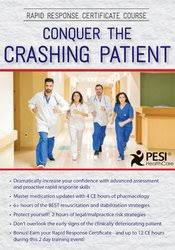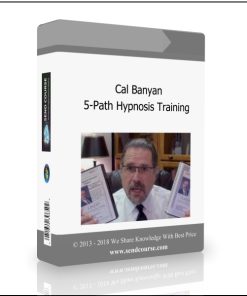Rapid Response Certificate Course: Conquer the Crashing Patient – Sean G. Smith | Available Now !
$300.00 Original price was: $300.00.$85.00Current price is: $85.00.
Rapid Response Certificate Course: Conquer the Crashing Patient – Sean G. Smith | Instant Download !
PLEASE CHECK VIDEO OF ALL CONTENTS HERE:
Imagine you are taking care of your patient – anywhere – any department/floor in the hospital, a nursing home, surgical site or clinic setting and suddenly grasp that an emergency situation is unfolding. Do you know what to do? Are you confident in your response? Even if you call an ambulance or have a rapid response team coming, YOU may still be taking care of that patient for up to 8 minutes or more. In that time, what can YOU do to help save lives? There are times in the past you wish you had done more….
This intense recording will provide new clinical insights and critical thinking skills so you won’t need to feel uncertain, scared or at risk anymore. The ability to assess, intervene and advocate will be reinforced through exciting clinical cases. You will experience the dramatic changes in your own practice when you work your next shift! PLUS, you will earn a Certificate in Patient Crisis Prevention and up to 12 CE Hours!
- Dramatically increase your confidence with advanced assessment and proactive rapid response skills
- Master medication updates with 4 CE hours of pharmacology
- 6+ hours of the BEST resuscitation and stabilization strategies
- Protect yourself! 2 hours of legal/malpractice risk strategies
- Don’t overlook the early signs of the clinically deteriorating patient
- Identify current challenges relative to your specific practice environment and patient populations.
- Develop a proactive plan to respond to your deteriorating patient.
- Learn the mental strategies necessary for success, self-care, and process improvement when dealing with critically ill patients.
- Integrate a comprehensive review of systems, with subtle but key red flag clinical assessment findings.
- Incorporate a graduate level understanding of pharmacology into your current clinical practice with respect to the pre-, peri-, and post-arrest management of the medically fragile patient.
- Apply advanced laboratory medicine concepts into your current clinical practice with respect to the “at risk” patient.
- Recognize the subtle signs from the “perfect storm” patient.
- Choose the best interventions for stabilization of the deteriorating patient.
- Determine the key interventions to stabilize the successfully resuscitated patient prior to or post transfer.
- Analyze the latest clinical practice guidelines for common pathologies and comorbidities.
- Evaluate landmark case studies to identify key failures in recognition and rescue of the crashing patient.
- Assess legal documentation strategies to protect yourself and your practice.
Proactive Planning: Begin with the End in Mind
- Pre-Planning for the worst at every patient encounter
- Mental strategies for success
- Failure to rescue and how to avoid it
- Proactive risk assessment of practice environment/patient populations
- Clear coherent communication of high-risk information
- Concise comprehensive management of the crashing patient: Before, during and after the code
Advanced Assessment: Next Level Connection of Form and Function
- Review of Major Systems (Neurologic, Cardiovascular, Pulmonary, Multisystem)
- Integrated advanced laboratory medicine/Clinical implications
- Differential diagnosis/ Consults/Follow up studies
Pathology: Priority Problems, Rapid Recognition and Rescue
- For each of the 25+ pathologies below, the following will be discussed:
- Presentation: Rapid review of form and function
- Pathophysiology: Complications/Comorbidities
- Projected clinical course: Where are we going with this?
- Palliation and pharmacology: Cutting-edge practice guidelines
Neurology
- Neuromuscular Disorders, Meningitis, Toxicology (Overdose), Traumatic Brain Injury/Concussion, Stroke/TIA, Dementia/Delirium, Agitated/Combative Patients
Cardiovascular
- Dysrhythmias, Acute Coronary Syndrome, CHF, Heart Failure, Cardiomyopathies
- Endocarditis, Pericarditis, Peripheral Vascular Disease
Pulmonary
- Asthma/Upper Respiratory, Anaphylaxis, Aspiration/Dysphagia, COPD, Pneumonia
Metabolic/Endocrine Complex Comorbidities and Emergencies
- Chronic/Acute Kidney Disease, Renal Calculi, Hypertension, Diabetes
Gastrointestinal/Genitourinary
- Cholecystitis, Pancreatitis, Cirrhosis, Hepatitis, Infection (UTI, STI, etc.)
Psychosocial
- Screening for: Abuse, Neglect, Depression/Suicidal Ideation
Shock States, Sepsis, and Trauma
- Hypovolemic, Distributive, Obstructive
- Multisystem Management of the Poly-trauma Patient
Legal Lessons: Protect Your Practice… Tips, Tricks, Pearls, and Pitfalls
- Professional issues/Potential pitfalls (Delegation, Scope, EMTALA, etc)
- Rapid risk assessment and analysis
- Limit liability
- Defensible documentation
Putting It All Together: CaseBased Review
Identify Key Missed Moments, Lessons Learned and Best Practices
- Assessment
- Intervention
- Documentation
Tag: Rapid Response Certificate Course: Conquer the Crashing Patient – Sean G. Smith Review. Rapid Response Certificate Course: Conquer the Crashing Patient – Sean G. Smith download. Rapid Response Certificate Course: Conquer the Crashing Patient – Sean G. Smith discount.
1 review for Rapid Response Certificate Course: Conquer the Crashing Patient – Sean G. Smith | Available Now !
| 5 star | 100 | 100% |
| 4 star | 0% | |
| 3 star | 0% | |
| 2 star | 0% | |
| 1 star | 0% |
Sorry, no reviews match your current selections
Q & A
Ask a question
Your question will be answered by a store representative or other customers.
Thank you for the question!
Your question has been received and will be answered soon. Please do not submit the same question again.
Error
An error occurred when saving your question. Please report it to the website administrator. Additional information:
Add an answer
Thank you for the answer!
Your answer has been received and will be published soon. Please do not submit the same answer again.
Error
An error occurred when saving your answer. Please report it to the website administrator. Additional information:
Related products
Ecommerce
Ecommerce
NLP & Hypnosis
Ecommerce
Ecommerce












fast shipping | Rapid Response Certificate Course: Conquer the Crashing Patient – Sean G. Smith